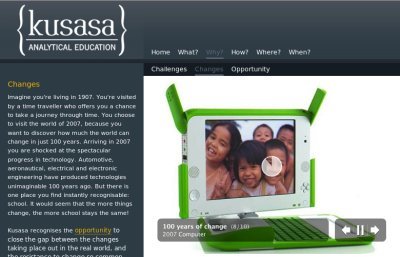Warning: This post ended up longer than planned, if you are bored easily, only read the first two paragraphs 
I’m a bit surprised that there haven’t been noise about this on the planets, but it’s probably due to the long weekend and people generally spending less time with their computers.
Via Slashdot, the OLPC XO Laptop will (be able to run) run Windows when it is sold in the US. The writer of the article considers it to be a heavy blow to the open source world, I think that “heavy blow” might be an overstatement.
I can understand why a lot of people, especially in education, would want to run Windows on the machine. The vast majority of educational software out there is written for Windows, and often in such a way that they can’t be ported to a free operating system in an easy way, or at a low enough cost to make it worth while. The problem is very much similar to running games on GNU/Linux. In some cases, the design of the game makes it incredibly easy to port over. In some cases, especially where very specific technologies such as DirectX are used, it can quickly become very complicated.
In South Africa, we’ve seen some shifts, even though slight shifts, to make educational software more web based. In the tuXlab project, the number 1 request from the schools are for more educational content. The Shuttleworth Foundation and Inkululeko Technologies have sourced some real good educational suites for these schools, and it got the attention of some of the other software vendors who didn’t get a slice of the pie. The shift that we observed was that more of the local educational software companies were using more and more web-based software tools, and also making more use of Flash (hopefully that will shift again to svg/javascript or even something better), specifically so that schools running free software could run their software. Now and again, we had a school asking us whether they may install Windows on their machines, so that they could run the same educational software in their tuXlab than in their Windows lab, and we would just explain to them that it would kind of defeat the purpose of their tuXlab, and since the lab run as an LTSP network, that it would be difficult to do it from a technical perspective too. As time progressed, and the availability of pre-packaged software grew for the lab, teachers started to prefer using GNU/Linux. A few schools even said no when they were free Microsoft labs to replace their tuXlabs. In my opinion, that is very big, considering that the one particular school ran their tuXlab on second hand computers, and that they were offered brand new Windows machines as replacements.
Sorry, back to the XO. I think that the interface truly innovative, and the system has the potential to provide a high quality and stable environment to develop and deliver software and content. If you look at DirectX again, for example, the latest version requires you to run Windows Vista, and some of the technologies, which is widely used in educational software (such as DirectDraw), is being deprecated. For schools that use Microsoft labs and use Windows based software, this causes a huge admin overhead, which is an overhead that most schools can’t afford to have. For the developers of the software, it causes even more problems. Firstly, they have to spend money to port their software to the new Microsoft technologies. Secondly, they have to get their clients to upgrade to a new version of Windows before they can get a return on updating their software.
If you consider a GNU/Linux system though, the application interfaces are quite stable, and even when new technologies are introduced, you are still able to access the older technologies to support your application. I think that, over time, software development houses will discover the benefits of using cross-platform technologies to develop their software, and gradually move away from technologies that limit them and their clients.
One specific educational revolution that might take place would be an ideal application for the XO Laptop, and that’s the Classroom Coders project (that’s just a working name), here’s Mark Shuttleworth’s blog entry about a two day workshop on it that was held last year. Hopefully we can teach kids to think for themselves again, instead of teaching them how to shut up and listen. All that the current schooling system is good for, it seems, is to teach kids how to look busy when they are working in an office one day, and I personally think that it is ridiculous. People are discouraged to think for themselves and just to blend in with the masses, I hope that if I have kids one day, that they wouldn’t have to go through a pathetic system as I did.
Apologies again for the long rant…














Recent Comments